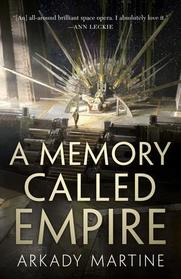Readable, but ultimately disappointing. I didn't feel that the author took full advantage of her premise -- a diplomatic thriller, set in a complicated political and cultural landscape extrapolated from the Aztec Empire -- to make me feel that I was reading anything deep or transformative about life, politics, the universe or anything.
Think about it for a moment. (As the blurbs on the cover encourage you to do -- wild "best thing since sliced bread" claims abound ...) Iain M. Banks Culture novels are ripping yarns - but they are also thoughtful ruminations on how ideals (socialism; a society dedicated to absolute equality and fairness) run smack into the realities of political complications, and the messiness of individual lives. Ann Leckie's Imperial Radch novels -- again, ripping yarns, but also, on another level (like Banks), playing with issues of identity and gender fluidity. Another author who should, I think, have been mentioned, but wasn't (probably because some 12-year-old editor either hadn't heard of her, or thought she was so old and kinda boooring ...) is Ursula Le Guin. whose "Left Hand of Darkness" is also about a painfully young diplomat, whose faulty pre-conceptions about the people and culture he is supposed to be liaising with results in tragedy, but also ultimately change (political and personal).
Comparing "A Memory Called Empire" with "The Left Hand of Darkness" is probably sufficient to explain why I was underwhelmed. I just felt, in spite of all the promised edginess about gender and identity, that there was no there, there.
The main character, least-well-briefed diplomat in the known Universe Mahit, and her cohorts felt awfully young, and their immediate to-the-death bond completely inexplicable and unrealistic. ("I just met you five minutes ago, and you represent the empire that is thinking of steamrolling over my homeland, but hey, I trust you with my life ..." Uh-huh.)
Having said that -- I would still say, readable, and Martine is one to watch. I liked the Aztec culture. It felt that a society that had genuinely evolved from those roots, clinging to certain cultural lodestones (the stylized names, the symbolism of blood, the verbal imagery and storytelling) without overdoing it.
Think about it for a moment. (As the blurbs on the cover encourage you to do -- wild "best thing since sliced bread" claims abound ...) Iain M. Banks Culture novels are ripping yarns - but they are also thoughtful ruminations on how ideals (socialism; a society dedicated to absolute equality and fairness) run smack into the realities of political complications, and the messiness of individual lives. Ann Leckie's Imperial Radch novels -- again, ripping yarns, but also, on another level (like Banks), playing with issues of identity and gender fluidity. Another author who should, I think, have been mentioned, but wasn't (probably because some 12-year-old editor either hadn't heard of her, or thought she was so old and kinda boooring ...) is Ursula Le Guin. whose "Left Hand of Darkness" is also about a painfully young diplomat, whose faulty pre-conceptions about the people and culture he is supposed to be liaising with results in tragedy, but also ultimately change (political and personal).
Comparing "A Memory Called Empire" with "The Left Hand of Darkness" is probably sufficient to explain why I was underwhelmed. I just felt, in spite of all the promised edginess about gender and identity, that there was no there, there.
The main character, least-well-briefed diplomat in the known Universe Mahit, and her cohorts felt awfully young, and their immediate to-the-death bond completely inexplicable and unrealistic. ("I just met you five minutes ago, and you represent the empire that is thinking of steamrolling over my homeland, but hey, I trust you with my life ..." Uh-huh.)
Having said that -- I would still say, readable, and Martine is one to watch. I liked the Aztec culture. It felt that a society that had genuinely evolved from those roots, clinging to certain cultural lodestones (the stylized names, the symbolism of blood, the verbal imagery and storytelling) without overdoing it.




